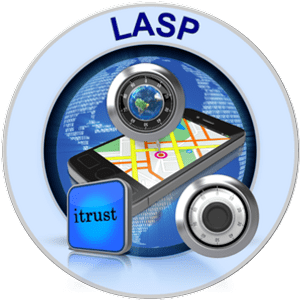LASP

Localisation Assurance Service Provider
A software and service to verify and certify the user’s location. This service has been developed in partnership with ESA and the University of Luxembourg.
Project duration: 24 months (2010-2012)
Consortium: itrust consulting, SnT (University of Luxembourg)
Context description

Global Navigation Satellite Systems (GNSS) are becoming popular for everyone’s use which is a vehicle for the emergence of services, called Location-Based Services (LBS). One problem is that the GNSS-like signals can be used without the users’ and LBS providers’ being able to assure that the location obtained is correct and has not been altered either intentionally or by mistake.
These security issues may hinder the current development of LBS in sensitive areas such as those related to protection against vehicle theft, accident reconstructions, alibi verification, monitoring the transportation of hazardous materials, etc.
Objectives
The LASP project, lead by itrust consulting, aims at developing a demonstrator able to provide a guarantee to LBS providers that a piece of localisation data acquired by a user is correct.
LASP architecture combines the following elements:
- A set of security checks able to detect whether a localisation obtained by a receiver is correct;
- A Public Key Infrastructure (PKI) to enable the LBS providers to verify the electronic signature of localisation certificates.
The target activity sectors of LASP are automotive industries (insurance, road toll, etc.), fleet and resource management, location-based access control (physical or logical), etc.
Role of itrust consulting
The LASP project started at the end of 2010 and is managed by itrust consulting. It is executed in collaboration with the Interdisciplinary Centre for Security, Reliability and Trust (SnT) of the University of Luxembourg. This collaboration is part of a long-term agreement in which itrust consulting supports a PhD thesis entitled “Secure and Private Location Proofs: Architecture and Design for Location-Based Services”
High-level protocol
The LASP service is based on the existence of a trusted third party (LAP – Localisation Assurance Provider), implememented in the context of this project, that receives certification requests from users, evaluates the assurance level, and returns it to the user in the format of a digitally signed certificate. The certificate includes the position, time, accuracy and the assurance level.A user who holds such a certificate is able to access services that require a certified localisation. This protocol was first proposed in a
scientific paper by itrust and NSN at the ENC-GNSS 2009 in Naples, Italy.
 Security Checks
Security Checks
The main purpose of the LAP is the evaluation of the assurance level of certification requests. This evaluation is carried out through a set of algorithms, called security checks, that assess many GNSS signals’ properties. The current implementation includes the following strategies:
- SNR: by checking if the received SNR is above reference levels estimated or measured for different PRN and elevation angles;
- Doppler: by verifying if the measured Doppler shift agrees with constellation and user dynamics, and if measurements from different frequencies agree;
- Navigation data: by comparing the navigation data of the receiver with trustworthy web sources;
- Visible satellites: by verifying if satellites reported by the user are visible at the place where he claims to be;
- Ground height: by checking if the claimed position corresponds to a ground height close to the Earth’s surface;
- Clock bias: by monitoring for abnormal clock jumps;
- RAIM: giving an indication about the consistency of pseudoranges using redundant measurements;
- Consistency with other positioning sources (e.g. Wi-Fi);
- Other plausibility checks, such as the possibility to reach one position from a previous one in a certain amount of time.
The tests performed with a signal repeater in a controlled environment show that the clock bias algorithm detects the beginning and the end of attacks even when the average delay introduced by meaconing stations is just 80 nanoseconds. A
scientific paper describing the algorithm was presented at the ENC 2012 in Gdansk, Poland.
Dissemination
- Scientific papers:
- Daniel Marnach (itrust), Sjouke Mauw (UL), Miguel Martins (itrust), Carlo Harpes (itrust), Detecting meaconing attacks by analysing the clock bias of GNSS receivers, European Navigation Conference, 25-27 April 2012, Gdansk, Poland.
- Carlo Harpes (itrust); Miguel Martins (itrust); Xihui Chen (UL); Gabriele Lenzini (UL), Sjouke Mauw (UL), Jun Pang (UL), “Implementation and Validation of a Localisation Assurance Service Provider”, NAVITEC 2012 & European Workshop on GNSS Signals and Signal Processing, 5-7 December 2012, ESTEC, Noordwijk, The Netherlands
- Other relevant events in which itrust has participated:
- Workshop on Location-based Services & Privacy Assurance, 4th February 2011, Luxembourg.
- United Nations Office for Outer Space Affairs (UNOOSA), International Committee on GNSS (ICG) Work Group B (WG-B) Application Subgroup Meeting, 12th-13th March 2012, Munich, Germany.
Munich Satellite Navigation Summit 2012, 13th-15th March 2012, Germany.
- State Visit of Grand Ducal family of Luxembourg to the Federal Republic of Germany, 23rd-25th April 2012. itrust consulting was part of the economic delegation who visited Berlin and the Hannover Messe in Hanover.
- DG-TRAC internal security workshop meeting, 21st May 2012, Luxembourg. This project is an ESA ARTES 20 IAP feasibility study lead by HITEC Luxembourg for Tracking and Tracing of Dangerous Goods in the Medical Sector. itrust presented its experience in designing security for LASP. In particular, the Protection Profile of LASP has been presented in detail.
- Material:
Exploitation
itrust is currently looking for partners or stakeholders interested in a solution for secure and accurate localisation in order to test and adapt the prototype to end-user needs.



 Global Navigation Satellite Systems (GNSS) are becoming popular for everyone’s use which is a vehicle for the emergence of services, called Location-Based Services (LBS). One problem is that the GNSS-like signals can be used without the users’ and LBS providers’ being able to assure that the location obtained is correct and has not been altered either intentionally or by mistake.
These security issues may hinder the current development of LBS in sensitive areas such as those related to protection against vehicle theft, accident reconstructions, alibi verification, monitoring the transportation of hazardous materials, etc.
Objectives
The LASP project, lead by itrust consulting, aims at developing a demonstrator able to provide a guarantee to LBS providers that a piece of localisation data acquired by a user is correct.
LASP architecture combines the following elements:
Global Navigation Satellite Systems (GNSS) are becoming popular for everyone’s use which is a vehicle for the emergence of services, called Location-Based Services (LBS). One problem is that the GNSS-like signals can be used without the users’ and LBS providers’ being able to assure that the location obtained is correct and has not been altered either intentionally or by mistake.
These security issues may hinder the current development of LBS in sensitive areas such as those related to protection against vehicle theft, accident reconstructions, alibi verification, monitoring the transportation of hazardous materials, etc.
Objectives
The LASP project, lead by itrust consulting, aims at developing a demonstrator able to provide a guarantee to LBS providers that a piece of localisation data acquired by a user is correct.
LASP architecture combines the following elements:
 Security Checks
The main purpose of the LAP is the evaluation of the assurance level of certification requests. This evaluation is carried out through a set of algorithms, called security checks, that assess many GNSS signals’ properties. The current implementation includes the following strategies:
Security Checks
The main purpose of the LAP is the evaluation of the assurance level of certification requests. This evaluation is carried out through a set of algorithms, called security checks, that assess many GNSS signals’ properties. The current implementation includes the following strategies: